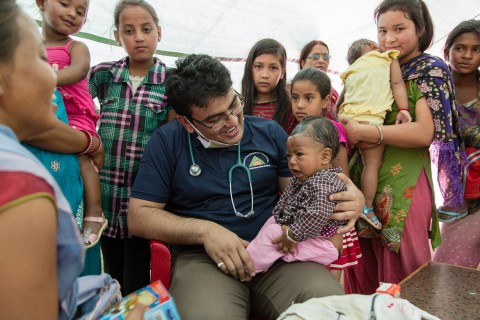This week I am writing from New York where I am following UN meetings on the Millennium Development Goals (MDGs). This is an important milestone as the international community has its final chance to have a say about how well or bad the world has done to achieve the MDGs. The focus from next week forward will be on discussing and agreeing a new set of sustainable development goals. Health should have an important presence in the new goals given important challenges ahead like Non-Communicable Diseases (NCDs) and further strengthening of immunization policies, without forgetting the unfinished business of infectious and neglected tropical diseases (NTDs).
At the time of the historic UN General Assembly in September 2011, when world’s governments decided to take concerted actions to fight NCDs, the international pharmaceutical industry had already committed to a ten-point policy framework built on the four key areas of research and development, access to medicines, prevention and education, and partnerships. Under this framework, we’ve commissioned, among others, a number of studies focusing on NCDs, including one describing how primary health care (PHC) can be strengthened to help meet several NCD challenges. Commissioned to the Johns Hopkins University the study was co-authored by Margaret Kruk, Felecia Marie Knaul and Gustavo Nigenda. The authors explain that while primary care is positioned as the main platform to respond to NCDs, health systems in low- and middle-income countries are too often unprepared to address NCD related challenges because of several reasons. These include a historic focus on infectious disease and maternal/child health, low human and financial resources, and lack of screening and diagnostic capacity. Based on a number of successful experiences, the authors offer solutions which require a radical change in how we look at primary care and how it is funded.
Strengthening primary care could strike twice in the fight against NCDs by offering a basis not just for delivering care, including palliative care, and managing the diseases, but also to help prevent diseases. Reconfiguring primary care requires first of all putting the patient rather than the disease at the centre. To achieve this, systems should benefit from setting up of multi-disciplinary care teams, use of IT and other improvements in medical records tracking. A case study on how to adapt HIV/AIDS chronic care to diabetes in Cambodia involving the Cambodian Ministry of Health and Medecins Sans Frontieres (MSF) led after two years to 71% of diabetes adhering to their treatments plans. Providing screening and follow up to women in remote and poor areas presents a particular challenge and
the “See and Treat” mobile cervical cancer screening project in Peru has shown how taking an innovative approach can save lives. In just two years (2009/2010) mobile units with online medical records screened 37,774 women for cervical cancer. Innovative technologies are part of the solution, as they can dramatically scale up existing primary care services.
Secondly, innovations in service delivery are needed. Devolution in service delivery is important in setting where there is scarcity of doctors. Task shifting towards other healthcare professional is needed to fill the important gap of 25% of doctors practicing in rural areas where 45% of the world’s population lives. To achieve this, important fine-tuning is needed to make sure that financing is stable, regulatory reforms are planned and executed and supervision systems are put in place.
Innovation and in particular mHealth is one such area where the pharmaceutical industry makes a contribution. Just a few months ago, we partnered with the International Telecommunication Union (ITU) on Be He@lthy, Be Mobile, an initiative jointly led by the ITU and the World Health Organization (WHO). The pharmaceutical industry is contributing knowledge and resources, lessons learned, and technical expertise to develop the best solutions for mHealth interventions for NCDs. Our publication, Health at your fingertips, a directory of pharmaceutical companies’ and associations’ mHealth initiatives, shares know-how and ideas for up-scaling projects and has a number of examples that support primary care. I would like to highlight two projects currently conducted in Ghana and Kenya. Use of mHealth solutions is encouraging because it could help empower communities and create mission ownership, always a fundamental box to check when setting up global health objectives.
With the new sustainable development goals soon up-for-discussion in New York and the necessary focus of some of them on addressing NCDs, reconfiguring primary care is an important step that cannot be overlooked. Follow me on twitter @MarioOttiglio and I’ll keep you posted from New York on 25 September.











